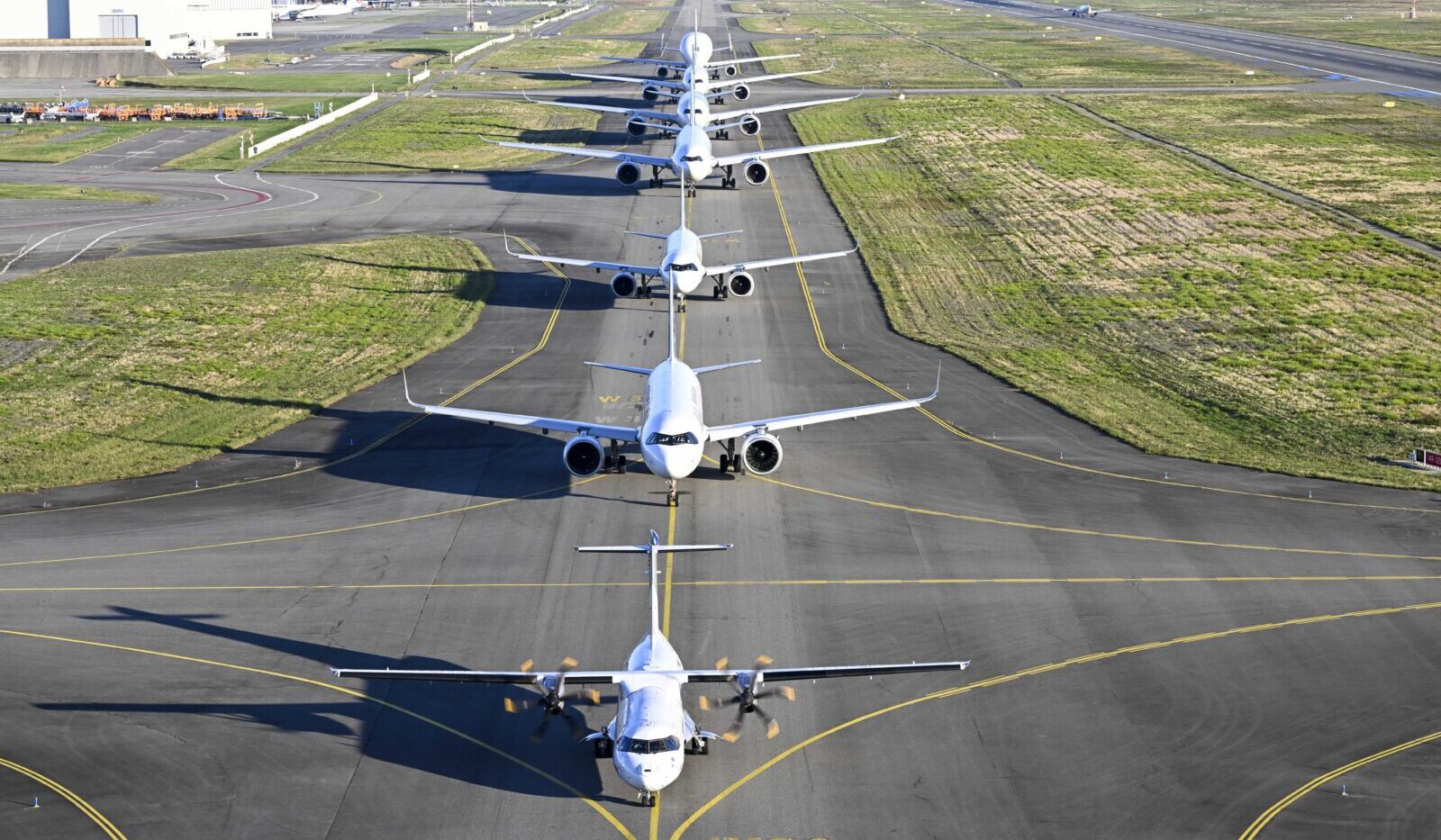Stay Up to Date
Submit your email address to receive the latest industry and Aerospace America news.
Airbus aircraft lined up in 2024 at the company’s facility in Toulouse, France. Credit: Airbus
Airbus’ ambition to deliver more aircraft than it did in 2024 may hinge on the impact of the tariffs enacted in early April by U.S. President Donald Trump.
In Wednesday calls with journalists and analysts, CEO Guillaume Faury called for a return to the 1979 agreement that had allowed widespread duty-free trade of aircraft and aviation components.
“It appears to us there will be only losers in the aerospace industry, and in particular in the U.S.,” Faury said, though he noted that it is too early to quantify the extent of the impact. He said that Airbus wasn’t directly coordinating with Boeing, “but I would speculate that they have also a vested interest in being back to the ex-ante situation.”.
Indeed, Boeing CEO Kelly Ortberg said last week that the company is in frequent communication with the Trump administration. “We’re spending a lot of time making sure the administration understands the implications of either short-term or long-term tariffs on not just our company, but the overall aviation industry here in the U.S,” Ortberg told investors, analysts and journalists during an April 23 call about its earnings for the first three months of 2025.
For its own January-March report, Airbus opted to exclude the impact of tariffs on its forecasts and left its guidance for the year unchanged. The company expects to deliver 820 jets in 2025, compared to 766 last year, with an adjusted operating profit of around 7 billion euros ($7.9 billion). Its adjusted operating profit for the first three months of the year was 624 million euros ($707.2 million), and revenue increased 6% over 2024 to 13.5 billion euros ($15.3 billion).
Thus far, the tariffs have increased the cost of specific aircraft components that Airbus imports from China for its U.S. production line in Mobile, Alabama, Faury said, but he emphasized that these constitute very few cases in the company’s supply chain. Along with the Alabama facility, Airbus has A320 assembly lines in Tianjin, China; Toulouse, France; and Hamburg, Germany — an advantage in a world that is “growing in the direction of deglobalization,” Faury said.
Another early impact of the tariffs has been on airline customers. In the U.S., Delta and American Airlines are among the carriers who announced this week that they are not willing to pay the additional duties on aircraft they have ordered. On the media call, Faury ruled out the possibility that Airbus would pay the difference, but later told analysts during the second call that the company is working with airlines to help mitigate the impact. Possible solutions include exporting the aircraft to other countries where the carriers operate to avoid the duties.
“I want to believe that the end game will be these tariffs on civil aerospace goods going back to zero,’” Faury said. “When and how remains to be seen.”
Aside from tariffs, Airbus continues to contend with supply chain disruption. Faury said he hoped that a deal to take over certain facilities and production lines from Spirit AeroSystems, announced on Monday, would assist in eliminating delays of fuselages, wings and other components for A320 and A350 jets. He also referenced the ongoing shortages at engine supplier CFM, a joint venture of French firm Safran and U.S. engine maker GE Aerospace. Airbus delivered 136 planes in the first three months of 2025, but says it would have delivered 153 if not for the 17 gliders left in inventory awaiting engines.
Faury said continuing airframe production in such circumstances was “unusual” but that he was confident that deliveries would quickly resume once the engines arrived.
About Charlotte Ryan
A London-based freelance journalist, Charlotte previously covered the aerospace industry for Bloomberg News.
Related Posts
Stay Up to Date
Submit your email address to receive the latest industry and Aerospace America news.




